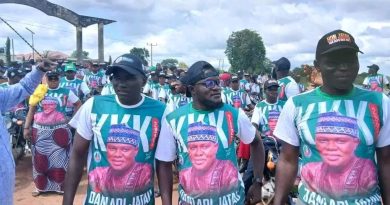Electoral Reform: INEC Urges National Assembly To Expedite Action
The Independent National Electoral Commission (INEC) has called upon the National Assembly to swiftly advance the passage of crucial electoral reform legislation, aiming to enhance the integrity and inclusiveness of Nigeria’s electoral process.

During a session organized by the National Assembly’s Committee on Electoral Matters at the Marriott Hotel in Lagos, INEC Chairman, Professor Mahmood Yakubu, outlined a series of proposed constitutional amendments designed to modernize and streamline the nation’s electoral framework.
Key proposals include the introduction of early, special, and diaspora voting through amendments to Sections 72(2), 117(1), 132(5), and 198 of the 1999 Constitution, facilitating participation for essential service providers, election officials, and Nigerians living abroad. INEC also seeks to strengthen its autonomy by empowering itself to appoint Heads of its State and FCT Offices.
Furthermore, INEC recommended the creation of an Electoral Offences Commission and a Political Party Regulatory Agency to address persistent challenges related to electoral crimes and political party management.
To promote inclusivity, amendments to Sections 48, 49, 71, and 91 were proposed to establish special seats for women and Persons with Disabilities (PwDs).
The proposed reforms also aim to clarify ambiguities and rectify conflicting provisions within the existing electoral laws, particularly regarding the transmission and collation of results under Sections 60, 64, and 65. INEC also seeks to clearly define its power to review election results by amending Section 65(1).
Further amendments to Sections 12(2) and 45 are proposed to support early and special voting, while the responsibilities for party registration, monitoring, and deregistration would be transferred to the proposed Political Party Regulatory Agency, requiring modifications to over 15 sections of the Act.
Other operational and procedural adjustments include clarifying timelines for candidate substitution under Section 31, redefining INEC’s role in managing and printing Permanent Voter Cards (PVCs), regulating party primaries more strictly, and banning unaccredited agents at collation centers.
Professor Yakubu underscored the urgency of these reforms by referencing the success of the 2023 General Election, which was conducted without postponement. He attributed this achievement to early planning and the utilization of domestic printing capabilities.
“Nigerian printers have the capacity to meet our needs. The real challenge was time management,” he stated, emphasizing the logistical complexities of handling sensitive electoral materials within a limited timeframe.
He highlighted that the 2023 election marked the first time since 1999 that all electoral materials were printed domestically, a feat commended by the Chartered Institute of Professional Printers of Nigeria (CIPPON).
Professor Yakubu stated that the early planning, as a result of earlier electoral act amendments, allowed for ample time to plan, and for the first time in three electoral cycles, the 2023 General Election was not postponed on account of logistics associated with the printing and delivery of sensitive materials.
INEC’s call to action aims to ensure a more transparent, efficient, and inclusive electoral process, reflecting the evolving needs of the Nigerian populace. The National Assembly is now tasked with considering and expediting the passage of these critical reforms.





